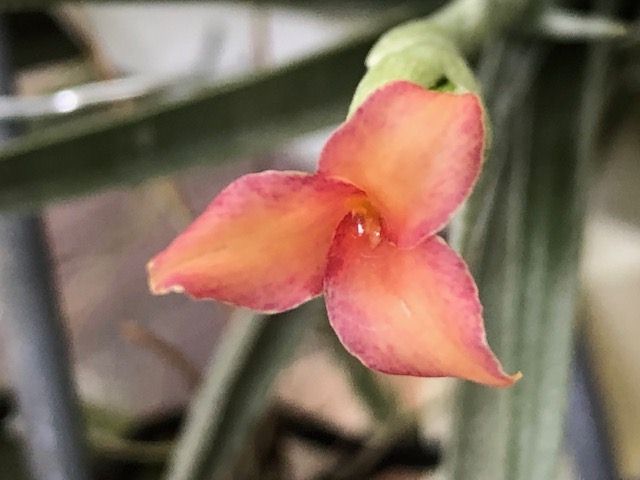
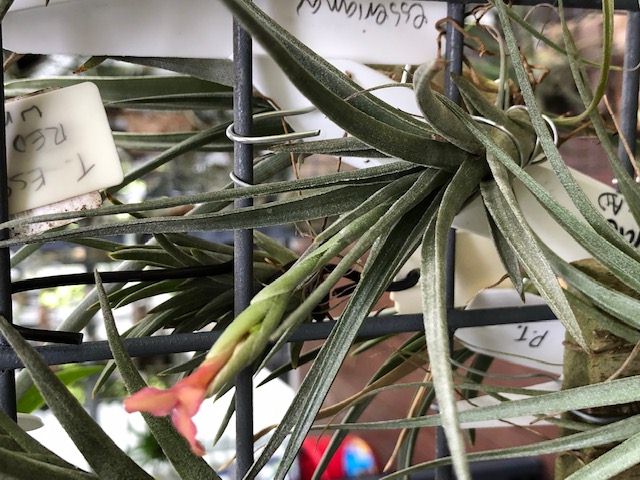
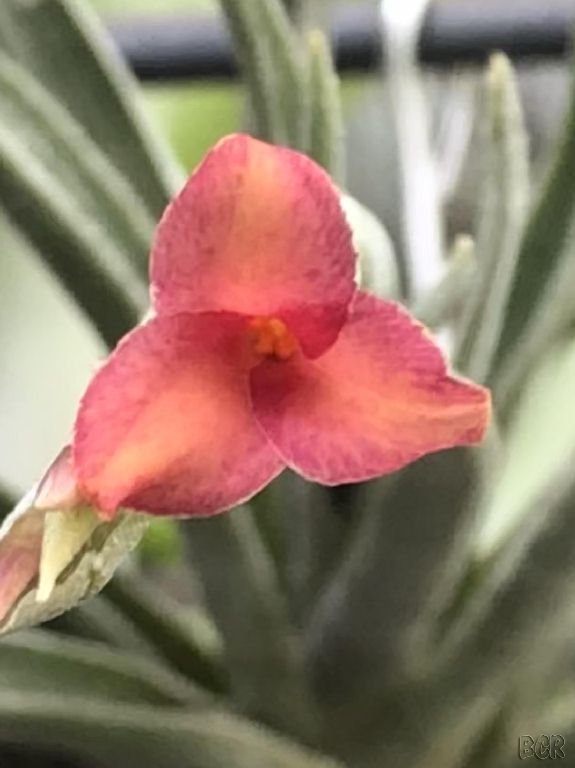
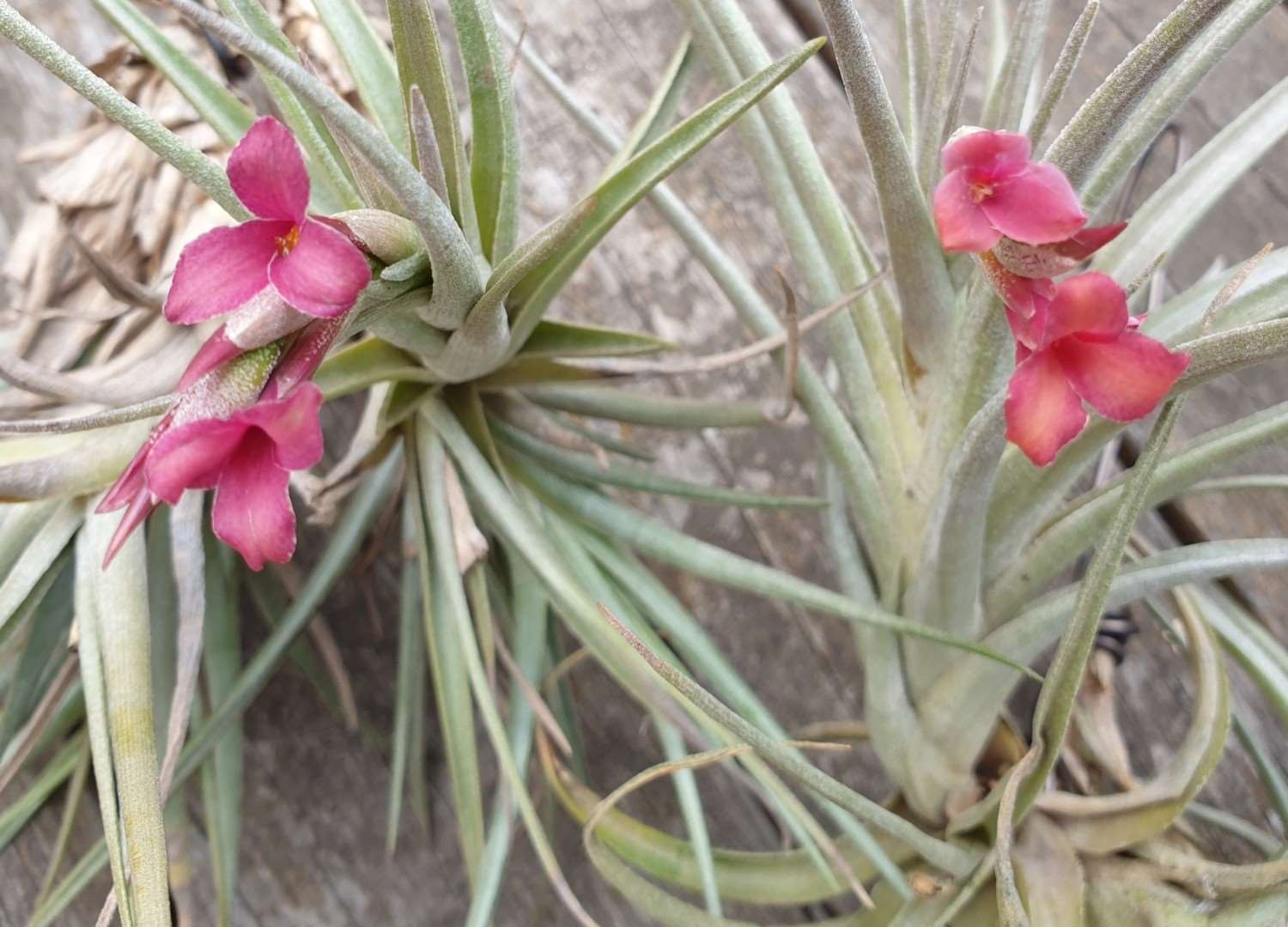
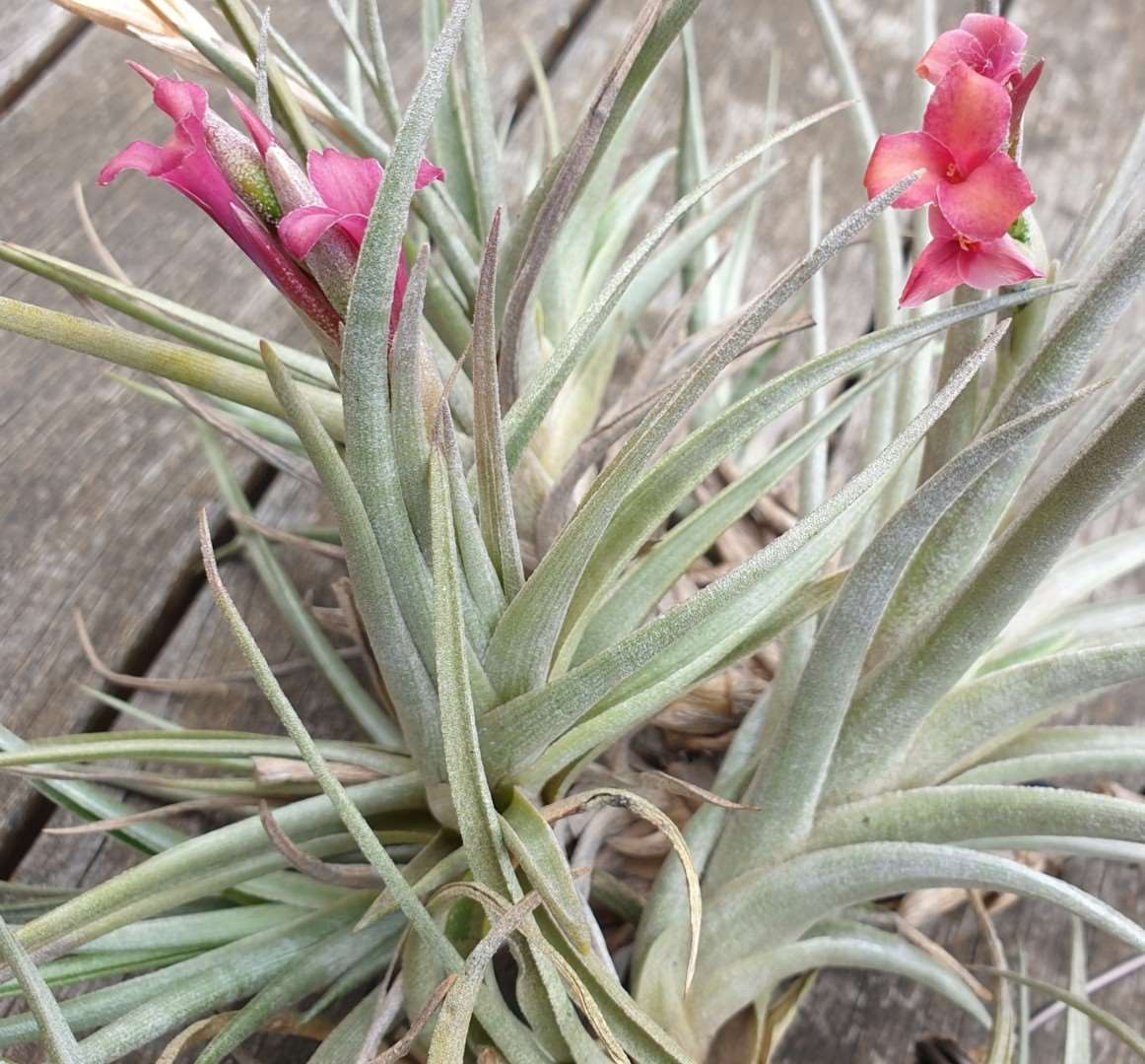
In 2006 Collector’s Corner nursery in Melbourne received a shipment of Tillandsia dorotheae from Rainforest Flora in California. This plant is named by Werner Rauh in 1987 for a plant collected by Dorothea Muir. He commented “Up to now T. albertiana is only known from the type locality, (Rio Sauce near Tucuman) and the nearest locations of T. argentina are far from it, and it is hard to assume that T. dorotheae is a hybrid between the two. T. dorotheae has been cultivated since 1972 in the Botanical Garden in Heidelberg and has proved to be constant. The flowering time falls, in cultivation, in the winter months; T. albertiana also flowers at this time, but T. argentina flowers in the summer months. The flowers of T. dorotheaes are open for several days and the petals dry the same colour.”
In 1996 Walter Till advised that he is convinced that T. dorotheae is a hybrid with T. albertiana and T. argentina as parents.
In 1995 Len Colgan and myself got T. dorotheae from Germany, collected from the wild, and offsets taken. They did not appear to be the same clone but had a similarity and we are fairly certain of their authenticity. Because it appears to be a natural hybrid you can expect back-crossing to either parent and thus variability.
Now to plants from Rainforest Flora. I do know that Paul and I had several Emails before his book was published about how you identified T. dorotheae from the Dimmitt hybrids. Therefore he was growing these Dimmitt hybrids. In the early 1990’s I pushed Dimmitt to name the 'better' ones of his hybrids. I say better because his crosses were supposed to be primary hybrids where progeny should be fairly stable but they weren't! From learning Dimmitt's hybridising techniques (no different to most other hybridists!) I was sure that foreign pollen was involved somewhere (or the species were already hybrids!) so yet again quoted parentage could be in doubt. We discussed these anomalies and decided not to proceed with cultivar names for these. So when Paul of Rainforest Flora obtained stock from Dimmitt under either formula or 'Mystic names' he was getting a dog's breakfast.
This is what I wrote in 2003
Tillandsia hybrids with T. albertiana as one of the parents by Butcher in J. Brom. Soc. 53(1) 25-6. 2003
In the period of 1982 to 1985 Mark Dimmitt of Tucson, Arizona saw the potential that T. albertiana had and wondered how its brilliant coloured flower could be combined with other species. He tried hybridising with 7 other species and the long wait started. Flowering started in the early1990’s and each crossing seemed to have its own character. A few plants were donated to local plant Societies but most have been distributed by Rainforest Flora and Bird Rock Tropical in California under their grex parentage. So, many of you may well be the owner of one of these man-made hybrids.
Man-made hybrids are not recognised under the ICNCP rules unless they have a Cultivar name and a photograph instead of the herbarium specimen. Here, you should know both parents and the role they play. Many are F1 generation meaning their progeny should look similar and can share the same cultivar name. BUT NOT ALWAYS so you need to be vigilant. As you are aware, ever since becoming Registrar and having the luxury of an easily accessible Data base, I have been promoting the legitimization of man-made hybrids previously known only by their formula.
Because we now have photographs, some of Mark Dimmitt’s hybrids have been named and information is as follows. Note that seed parent is named first and its name is that used at the time of pollination.
‘Mystic Albert’ = stricta x albertiana, named by D Butcher
‘Mystic Burgundy’ = muhriae x albertiana, named by B Timm
‘Mystic Circle’ = meridionalis x albertiana, named by D Butcher
‘Mystic Flame’ = albertiana x ixioides (and reverse), named by M Dimmitt
‘Mystic Flame Orange’ = albertiana x ixioides (and reverse), named by M Dimmitt
‘Mystic Rainbow’ = albertiana x arequitae, named by D Butcher
‘Mystic Rainbow Peach’ = albertiana x arequitae, named by D Butcher
‘Mystic Rainbow Pink’ = albertiana x arequitae, named by D Butcher
‘Mystic Trumpet’ = albertiana x xiphioides, named by M Dimmitt
‘Mystic Trumpet Peach’ = albertiana x xiphioides, named by M Dimmitt
‘Mystic Trumpet Pink’ = albertiana x xiphioides, named by M Dimmitt
‘Mystic Twins = albertiana x geminiflora, named by D Butcher
Paul has always been cagey about where he gets his stock and you will never know where his wild T. dorotheae came from and we do know he had 'Mystics'.
From a purist point of view I believe we in Adelaide have provenance and others may also have Germany as a source. Is it a T. dorotheae that came from the USA or is it a 'Mystic' where only some were registered and the lesser ones were NOT culled?
The plant that came from the USA as T. dorotheae had red to orange petals making it distinctive and looking somewhat like photos of T. ‘Mystic Trumpet’ to which it was aligned. But is it an offset from the original Dimmitt hybrid? As far as I can trace no importation to Australia has been made of a plant called ‘Mystic Trumpet’ with links to Dimmitt.
Therefore it seems prudent to use the name ‘Mystic Trumpet Enigma’ if Australians flower an odd looking T. dorotheae.